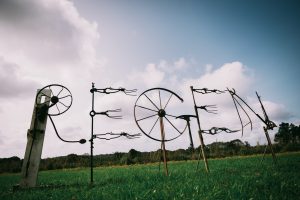
We continue our series of article in Jèrriais – Jersey’s own traditional native language. The ‘frouque’ in question is a digging fork, rather than a table fork. An English translation follows. This contribution comes from Jean Le Maistre.
Ch’est tréjous eune tâche întérêssante à chèrchi un sujet à propos pouor chutte lettre.
Eh bein, chutte fais pouor c’menchi, j’ai pensé qué la chose exceptionnelle dreinement ch’est combein d’plyie qué j’avons ieu ch’t ’hivé jusqu’ ach’teu. Ch’est încriyabl’ye dé vaie l’ieau dans les clios et sustout dans les mielles autou d’la Crabiéthe. En v’nant dés Laveurs ch’est à la drouaite dé l’autre côté d’la route quand nous arrive à la Mielle dé Morville. L’ieau est exactément comme eune p’tite Mathe au Seigneur auve un îlot dans l’mitan. L’ieau est presqu’ au nivé d’la route, cèrtainement pus haute qué j’ai janmais veu!
V’là tchi m’fait penser ès pouôrres fèrmièrs tchi sont en train d’plianter lus patates. Ch’est lé c’menchement d’eune nouvelle saîson et i’ continuent lé travas tchi c’menchitent l’année pâssée. L’année pâssée il’ avaient plianté la s’menche dé patates, les foui et les rentrer dans l ‘solyi ou ach’teu dans les grands haûgards. Éventuellement, mâter les patates, ach’teu auvec des bieaux jets i’ sont prêtes à plianter. Mais, à cause du temps i’ y’a pas moyen et les travailleurs ont presqué rein à faithe.
J’sis- t-i content dé n’être pas d’autre à fèrmer quand j’vais tout l’travas qu’il’ ont à faithe et ach’teu, à cause du temps, i’ peuvent rein faithe. Tchi sâpré câsse-tête! V’là tchi m’fait penser combein dû, combein difficile qué ch’ ’tait pour la généthâtion dé mes pathents. Dans lus cas, i’ n’avaient pon héthité d’eune fèrme. Nan valet! Fallait c’menchi au tout bas d’ l’êtchelle! Il’ avaient c’menchi auve un p’tit côti d’à bein près trente pèrques juste en d’ssus du p’tit mont tchi s’appelle Le Mont des Routeurs mais connu étout comme Crusoe à la Ville Bagot à St Ouën. Tout l’travas ‘tait fait à la main et l’côti était rapide. I’ n’fallait pas aver des rhonmatisses ou être court d’haleine!
Éventuellement ils eûdrent la chance dé louer eune p’tite fèrme qu’apparténait à la tante dé ma méthe. Auve tchiques clios v’là tchi lus donnit la pôssibilité d’acater un j’va et tchiques ôtis et un hèrnais. Presqué tout l’travas ‘tait fait à la main sinon pour la touônn’nie, la griffonn’nie, l’hèrchage et la tchéthue à plianter qu’était tout fait auvec lé j’va.
Pouor la pliant’tie, par exempl’ye, comment qu’la faithe a changi. Dans chu temps là nou ‘tait souvent chînq plianteurs pouor pouver faithe lé tou du clios et nou pouver plianter quatre ou chînq vrégies par jour. Ach’teu, ch’est comme des freunmions quand nou vait les travailleurs dans les clios. Souvent nou les vait arriver à sept heuthes du matîn et si lé clios est p’tit ou grand, tout est finni et clièrgi par méjeu !
Bein seux ch’est les grandes machinnes qu’ont changi tout. Tchique fais j’mé d’mande si, à l’av’nîn nou r’grett’ta d’aver utiliser des ôtis qu ’étaient si pésant et lé damage tchi peut êt’ fait souos terre. L’êvidence, en partie, est p’ t ‘être déjà là, comme dreinement nou-s-a veu l’ieau couôrre hors des clios et dans les routes. Ch’là ‘tait exceptionnelle lé temps pâssé pa’ce qué fallait pas cachi du tout sus la terre après la touônn’nie pour maînt’nîn la terre meubl’ye et en bouonne condition. Ch’est pouor chenna qué l’fèrmyi aime vaie les p’tits, et tchique fais même des gros vèrs, dans la terre! Ch’la est un aut’ sujet hardi întérêssant qué j’n’ai pas assez d’temps d’entamer aniet…
Translation:
It is always an interesting task to find a suitable subject for this letter. Well, this time to begin, I thought that the thing which has been exceptional recently is the amount of rain that we have had this winter up until now. It is incredible to see the water in the fields and particularly in Les Mielles around La Crabiéthe. Coming from Les Laveurs it is on the right, the other side of the road when you get to La Mielle de Morville. The water is exactly like a small Mathe au Seigneur (also known as St Ouën’s Pond) with a small islet in the middle. The water is almost at road level, certainly much higher than I have ever seen it.
That makes me think of our poor farmers who are trying to plant their potatoes. It is the beginning of a new season and it is a continuation of the work which they started last year. Last year they had planted their seed potatoes, harvested and brought them into the lofts or nowadays into the huge sheds. Eventually they ‘stand’ the potatoes and now with beautiful ‘shoots’ they are ready to plant. But because of the weather they cannot plant and as a result the workers have very little (work) to do.
Am I pleased that I am no longer farming when I see all the work that they have to do and now, because of the rain, they can’t do anything. What a headache! That makes me think about how hard and how difficult it was for my parent’s generation. In their case they had not inherited a farm. Goodness no! They had to start at the very bottom of the ladder. They had started with a small côtil of approximately thirty perch just above the little hill called Le Mont des Routeurs, but also known as “Crusoe” at Ville Bagot in St Ouën. All the work was done by hand and the côtil was steep. You must not have rheumatism or be short of breath (for this type of work).
Eventually they were fortunate to become tenants of a small farm which belonged to my mother’s aunt. With a number of fields it offered them the opportunity to buy a horse with a number of tools and a horse-cart. Nearly all the work was undertaken by hand except for the ploughing, scarifying, harrowing and the planting plough which were all horse drawn. For the planting, for example, how things have changed. In those days we were often five planters who were able to plant around the field and we could plant between four and five vergées in a day.
Now, they are like ants when you see the workers in the fields! Often you will see them arrive around seven o’clock in the morning and whether a field is small or large all the work is finished by mid-day.
Of course, it is the big machines which have changed everything. Sometimes I ask myself if, in the future we will regret having used tools which were so heavy and knowing the damage that can be done under the ground (surface). The evidence, in part, is maybe already there as recently we have seen the rainwater running out of the fields and into the roads. That was exceptionally rare years ago because it was considered poor practice to drive on the land after ploughing to maintain healthy soil in excellent condition. That is why the farmer loves to see the small, and sometime large, worms in the soil. That is another very interesting subject which I don’t have sufficient time to ‘open up’ today…




